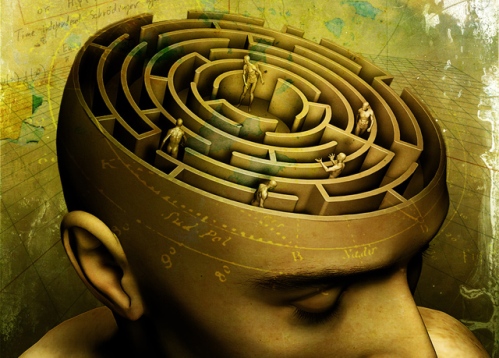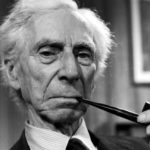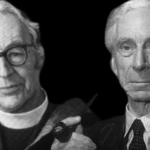The Road from Atheism: Dr. Edward Feser’s Conversion (Part 2 of 3)
by Dr. Edward Feser
Filed under Atheism, Conversion
NOTE: On Monday we shared Part 1 of Dr. Edward Feser's conversion story from atheism to theism. Today we're posting Part 2 and on Monday we'll post Part 3.
We'd also like to note that Dr. Feser's contributions at Strange Notions were originally posted on his own blog, and therefore lose some of their context when reprinted here. Dr. Feser explains why that matters.
Not that that led me to give up naturalism, at least not initially. A more nuanced, skeptical naturalism was my preferred approach—what else was there, right? My studies in the philosophy of mind reinforced this tendency. At first, and like so many undergraduate philosophy majors, I took the materialist line for granted. Mental activity was just brain activity. What could be more obvious? But reading John Searle’s The Rediscovery of the Mind destroyed this illusion, and convinced me that the standard materialist theories were all hopeless. That Searle was himself a naturalist no doubt made this easier to accept. Indeed, Searle became another hero of mine. He was smart, funny, gave perfectly organized public lectures on complex topics without notes, and said whatever he thought whether or not it was fashionable. And he wrote so beautifully, eschewing the needless formalisms that give a veneer of pseudo-rigor and “professionalism” to the writings of too many analytic philosophers. “That is how I want to write!” I decided.
Brilliant as he was as a critic, though, Searle’s own approach to the mind-body problem—“biological naturalism”—never convinced me. It struck me (and seemingly everyone else but Searle himself) as a riff on property dualism. But there was another major influence on my thinking in the philosophy of mind in those days, Michael Lockwood’s fascinating book Mind, Brain and the Quantum. Lockwood was also a naturalist of sorts, and yet he too was critical of some of the standard materialist moves. Most importantly, though, Lockwood’s book introduced me to Bertrand Russell’s later views on these issues, which would have a major influence on my thinking ever afterward. Russell emphasized that physics really gives us very little knowledge of the material world. In particular, it gives us knowledge of its abstract structure, of what can be captured in equations and the like. But it gives us no knowledge of the intrinsic nature of matter, of the concrete reality that fleshes out the abstract structure. Introspection, by contrast, gives us direct knowledge of our thoughts and experiences. The upshot is that it is matter, and not mind, that is the really problematic side of the mind-body problem.
This was truly revolutionary, and it reinforced the conclusion that contemporary materialism was shallow and dogmatic. And that Lockwood and Russell were themselves naturalists made it once again easy to accept the message. I got hold of whatever I could find on these neglected views of Russell’s—Russell’s The Analysis of Matterand various essays and book chapters, Lockwood’s other writings on the topic, some terrific neglected essays by Grover Maxwell, some related arguments from John Foster and Howard Robinson. David Chalmers and Galen Strawson were also starting to take an interest in Russell around that time. But once again I found myself agreeing more with the criticisms than with the positive proposals. Russell took the view that what fleshes out the structure described by physics were sense data (more or less what contemporary writers call qualia). This might seem to entail a kind of panpsychism, the view that mental properties are everywhere in nature. Russell avoided this bizarre result by arguing that sense data could exist apart from a conscious subject which was aware of them, and Lockwood took the same line. I wasn’t convinced, and one of my earliest published articles was a criticism of Lockwood’s arguments on this subject (an article to which Lockwood very graciously replied). Chalmers and Strawson, meanwhile, were flirting with the idea of just accepting the panpsychist tendency of Russell’s positive views, but that seemed crazy to me.
My preferred solution was to take the negative, critical side of the Russellian position—the view that physics gives us knowledge only of the abstract structure of matter—and push a similar line toward the mind itself. All our knowledge, both of the external world described by physics and of the internal world of conscious experience and thought, was knowledge only of structure, of the relations between elements but not of their intrinsic nature. I would discover that Rudolf Carnap had taken something in the ballpark of this position, but the main influence on my thinking here was, of all people, the economist and political philosopher F. A. Hayek. The libertarianism I was then attracted to had already led me to take an interest in Hayek. When I found out that he had written a book on the mind-body problem, and that it took a position like Russell’s only more radical, it seemed like kismet. Hayek’s The Sensory Order and some of his related essays would come to be the major influences on my positive views.
But they were inchoate, since Hayek was not a philosopher by profession. That gave me something to do. Working out Hayek’s position in a more systematic way than he had done would be the project of my doctoral dissertation, “Russell, Hayek, and the Mind-Body Problem.” (Both here and in the earlier Master’s thesis link, by the way, Google books overstates the page count. I wasn’t that long-winded!) This was, to be sure, a very eccentric topic for a dissertation. Russell’s views were marginal at the time, and are still not widely accepted. Probably very few philosophers of mind even know who Hayek is, and fewer still care. But I thought their views were both true and interesting, and that was that. (If you want advice on how to climb the career ladder in academic philosophy, I’m not the guy to ask. But you knew that already.)
Spelling out the Hayekian position in a satisfactory way was very difficult. Lockwood had presented Russell’s position as a kind of mind-brain identity theory in reverse: It’s not that the mind turns out to be the brain, but that the brain turns out to be the mind. More precisely, visual and tactile perceptions of the brain of the sort a neurosurgeon might have do not tell us what the brain is really like, but present us only with a representation of the brain. It is actually introspection of our own mental states that tells us the inner nature of the matter that makes up the brain. It seemed to me that Hayek’s position amounted to something like functionalism in reverse: It’s not that the mind turns out to be a kind of causal network of the sort that might be instantiated in the brain, or a computer, or some other material system—understood naively, i.e. taking our perceptual experience of these physical systems as accurate representations of their intrinsic nature. Rather, introspection of our mental states and their relations is actually a kind of direct awareness of the inner nature of causation itself. We shouldn’t reduce mind to causal relations; rather we should inflate our notion of causation and see in it the mental properties we know from introspection.
So I then argued, and wrote up the results both in the dissertation and in another article. But the views were weird, required a great deal of abstractive effort even to understand, and one had to care about Hayek even to try, which almost no philosophers of mind do. To be sure, Searle was interested in Hayek in a general way—when Steven Postrel and I interviewed him for Reason, and when I talked to him about Hayek on other occasions, he even expressed interest in The Sensory Order in particular—but this interest never manifested itself in his published work. Chalmers very kindly gave me lots of feedback on the Hayekian spin on Russell that I was trying to develop, and pushed me to clarify the underlying metaphysics. But his own tendency was, as I have said, to explore (at least tentatively) the panpsychist reading of Russell.
And yet my own development of Hayek might itself seem ultimately to have flirted with panpsychism. For if introspection of our mental states gives us awareness of the inner nature of causation, doesn’t that imply that causation itself—including causation in the world outside the brain—is in some sense mental? This certainly went beyond anything Hayek himself had said. In my later thinking about Hayek’s position (of which I would give a more adequate exposition in my Cambridge Companion to Hayek article on Hayek’s philosophy of mind), I would retreat from this reading and emphasize instead the idea that introspection and perception give us only representations of the inner and outer worlds, and not their intrinsic nature.
This, for reasons I spell out in the article just referred to, offers a possible solution to the problem that qualia pose for naturalism. But because the view presupposes the notion of representation, it does not account for intentionality. Here my inclinations went in more of a “mysterian” direction. I had long been fascinated by Colin McGinn’s arguments to the effect that there was a perfectly naturalistic explanation of consciousness, but one we may be incapable in principle of understanding given the limitations on our cognitive faculties. I thought we could say more about consciousness than McGinn thought we probably could, but I also came to think that his mysterian approach was correct vis-à-vis the intentional content of our mental states. Lockwood and Hayek said things that lent plausibility to this.
I would later largely abandon the Hayekian position altogether, because it presupposes an indirect realist account of perception that I would eventually reject. (That took some time. The influence of indirect realism is clearly evident in my book Philosophy of Mind.) But I had come to some conclusions in the philosophy of mind that would persist. First, as Russell had argued, physics, which materialists take to be the gold standard of our knowledge of the material world, in fact doesn’t give us knowledge of the intrinsic nature of matter in the first place. The usual materialist theories were not even clearly thought out, much less correct. Second, a complete naturalistic explanation of intentionality is impossible.
But I was still a naturalist. It was also while still a naturalist that I first started to take a serious interest in Aristotelianism, though at the time that interest had to do with ethics rather than metaphysics. Even before I became an atheist I had been introduced to the Aristotelian idea that what is good for us is determined by our nature, and that our nature is what it is whether or not we think of it as having come from God. After becoming an atheist, then, I became drawn to ethicists like Philippa Foot, who defended a broadly Aristotelian approach to the subject from a secular point of view. Her book Virtues and Vices and Alasdair MacIntyre’s After Virtue were the big influences on my thinking about ethical theory during my atheist years.
One consequence of this was that I always took teleology seriously, because it was so clearly evident a feature of ordinary practical reasoning. (How did I reconcile this with naturalism? I’m not sure I then saw the conflict all that clearly. But in any event I thought that teleological notions could be fitted into a naturalistic framework in the standard, broadly Darwinian way—the function of a thing is to be cashed out in terms of the reason why it was selected, etc. I only later came to see that teleology ultimately had to be a bottom level feature of the world rather than a derivative one.)
After Virtue also taught me another important lesson—that a set of concepts could become hopelessly confused and lead to paradox when yanked from the original context which gave them their intelligibility. MacIntyre argued that this is what had happened to the key concepts of modern moral theory, removed as they had been from the pre-modern framework that was their original home. I would later come to see that the same thing is true in metaphysics—that the metaphysical categories contemporary philosophers make casual use of (causation, substance, essence, mind, matter, and so forth) have been grotesquely distorted in modern philosophy, pulled as they have been from the classical (and especially Aristotelian-Scholastic) framework in which they had been so carefully refined. As I argue in The Last Superstition, many of the so-called “traditional” problems of philosophy are really just artifacts of the anti-Scholastic revolution of the moderns. They flow from highly contentious and historically contingent metaphysical assumptions, and do not reflect anything about the nature of philosophical reflection per se. And the standard moves of modern atheist argumentation typically presuppose these same assumptions. But I wouldn’t see that for years.
Related Posts
Note: Our goal is to cultivate serious and respectful dialogue. While it's OK to disagree—even encouraged!—any snarky, offensive, or off-topic comments will be deleted. Before commenting please read the Commenting Rules and Tips. If you're having trouble commenting, read the Commenting Instructions.













